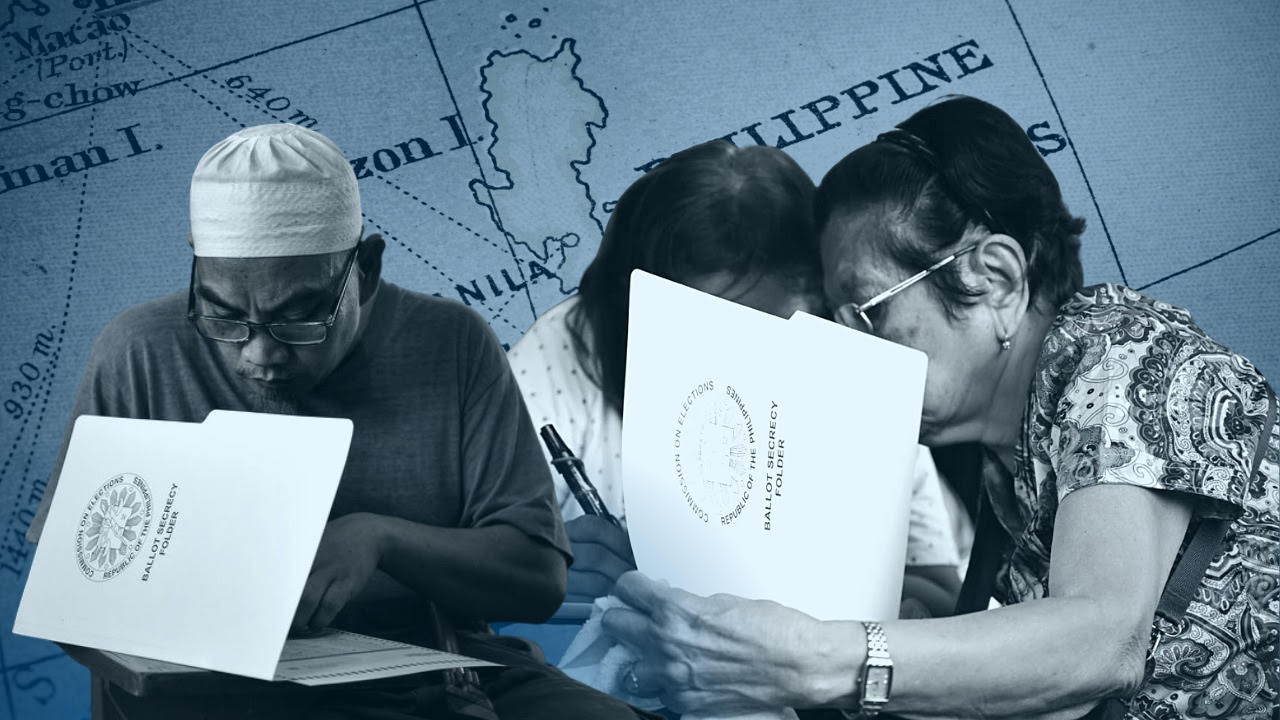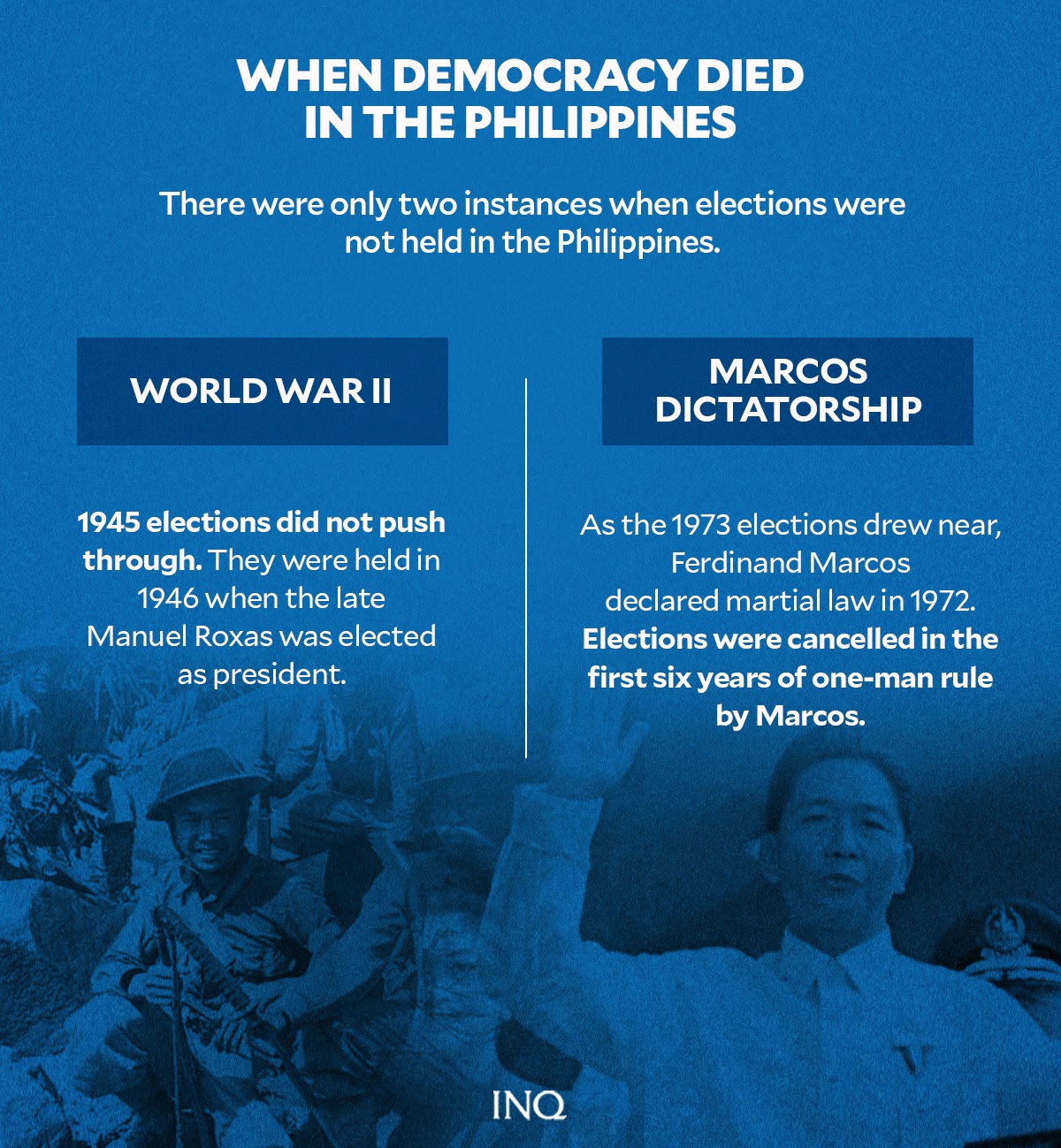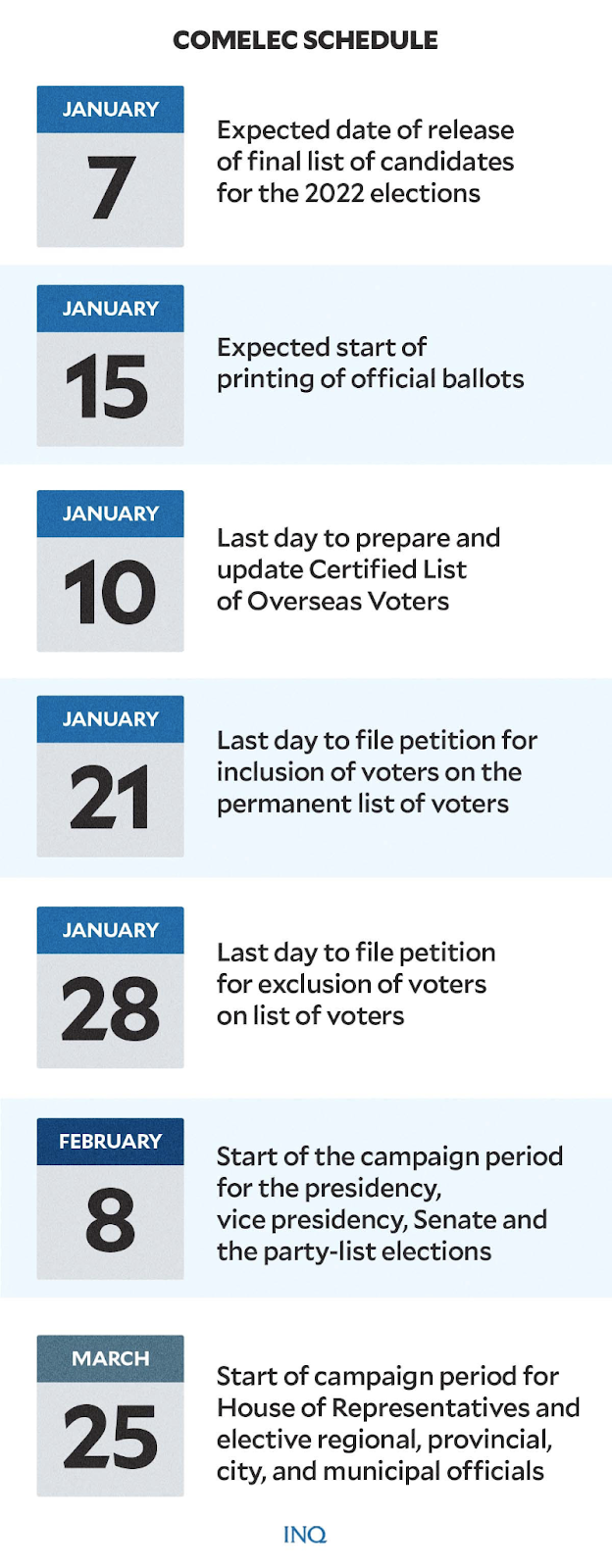Reopening COC filing: No-el, desperation or both?
MANILA, Philippines—The petition to reopen the filing of certificates of candidacy (COC) filed by the Cusi faction of the now fractious PDP-Laban mirrors the failure of what could have been a dominant political party to remain relevant.
In 2019, when PDP-Laban was still solid, it had five members in the Senate–Ronald dela Rosa, Bong Go, Manny Pacquiao, Aquilino Pimentel III, Francis Tolentino–and 84 in the House of Representatives, including Speaker Lord Allan Velasco.
READ: As Duterte-Pacquiao rift widens, ruling party’s future hangs in the balance
The advantage in numbers, however, was laid to waste because of a weak leadership and absence of clarity in plans for the 2022 elections, according to UP Diliman Prof. Ma. Ela Atienza.
“This is an administration party that failed to capitalize on its status and advantages to build a stronger party with stable and unifying leadership, good strategy, and a strong slate for the 2022 elections,” she told INQUIRER.net.
On Dec. 31, Energy Secretary Alfonso Cusi, who heads one faction of PDP-Laban, asked the Commission on Elections (Comelec) to “intently consider” reopening the filing of COC to “benefit” voters and candidates.
READ: PDP-Laban wing asks Comelec to reopen filing of COCs for 2022 polls
Cusi’s logic was that since cases are still pending at the Comelec involving candidacies, like those filed against Ferdinand Marcos Jr., the Comelec “cannot and should not” proceed with printing of ballots, a crucial stage in the conduct of the elections in May this year.
READ: Let Comelec rule on petition seeking to reopen COC filing, says Cusi
Atienza, however, saw this as a sign of a weakened political party grasping at straws and driven to disrespect the Constitution and election laws.
“It is trying to dictate the work of a constitutional body and acting like an entitled political brat,” Atienza said of the PDP-Laban Cusi faction.
RELATED STORY: De Lima: Maybe what Cusi-led faction really wants is no-election scenario
Election lawyer Emil Marañon III told INQUIRER.net that the PDP-Laban Cusi faction had all the time to plan for the elections and decide which candidates to field. “I don’t understand why they did not do those when they were still allowed,” he said.
Last year, the Cusi faction pulled off a string of surprises during the period for filing of COC. Go was nominated as presidential candidate but declined it. Dela Rosa emerged as a candidate for president but withdrew.
READ: Substitution and the political Frankenstein it created
A review of actions taken by the Cusi faction could show how the period for filing of COC was laid to waste.
Sept. 8, 2021: The Cusi PDP-Laban faction nominated Go as candidate for president and President Rodrigo Duterte as vice president.
Sept. 9, 2021: Go declined the nomination, saying he was not interested in the presidency and appealed for support for a candidate who would continue Duterte’s policies instead.
Sept. 23, 2021: Duterte officially accepts nomination by the Cusi faction to run as vice president.
Oct. 2, 2021: Go files COC for vice president. Duterte announces he was retiring from politics.
Oct. 8, 2021: Dela Rosa files COC for president 120 minutes after he was told to do so by Cusi faction leaders.
Nov. 13, 2021: Dela Rosa withdraws COC for president. Sara Duterte, the President’s daughter, files COC for vice president as running mate of Ferdinand Marcos Jr. Go drops VP bid and files COC for president under a previously unheard of group—Pederalismo ng Dugong Dakilang Samahan. Duterte says he was left in the dark on Sara’s VP bid under Marcos Jr. and would file COC for vice president, too.
Nov. 15, 2021: Instead of filing COC for vice president, like what he said on Nov. 13, 2021, Duterte files COC for senator.
Dec. 14, 2021: Go officially withdraws COC for president. Duterte also withdraws COC for senator.
Delaying elections
Atienza said it became clear that the PDP-Laban, which successfully fielded Duterte as presidential candidate through substitution in 2016, failed to consolidate its coalitions at a time when it still had the advantage to do so.
“It is possible that in their desperation, they want to derail the elections,” Atienza said.
Lutgardo Barbo, who is part of the PDP-Laban Pacquiao wing, shared this view as he opposed the petition filed by Cusi, saying it was a move to destroy the election process “for their own selfish and evil ends”.
READ: Cusi petition to reopen COC filing, a push for No-El, says PDP-Laban exec
“Their petition may result in delaying and derailing the electoral process and benefit from a chance to have failed elections to prolong their hold on power. Delay in the printing of ballots and processing of COC will have that effect,” he said.
RELATED STORY: Petition to reopen COC filing ‘laughable,’ says Kontra Daya
A provision of Article VII, Section 4 of the 1987 Constitution states: “Unless otherwise provided by law, the regular election for President and Vice President shall be held on the second Monday of May.”
Marañon said the phrase “unless otherwise provided by law” allows Congress to “reset” the elections by legislation. However, the Constitution is silent on the discretion of Congress. Is it allowed to delay the elections extensively?
He said the silence should be read through the other constitutional provisions, saying that for regular elections, June 30 is the start of the six-year term of a new President or Vice President.
“My reading is they can reset [the elections] provided that it will not affect the June 30 ‘start of office’. They can more or less move the second Monday of May to a few weeks but they don’t have the power to change the cycle in presidential terms,” he said.
In the Philippines, there were only two instances when elections were not held–during World War II and when the late dictator Ferdinand Marcos declared martial law.
The late President Manuel Quezon first won in 1935 with a term of six years “without reelection”. The prohibition for a second term was later amended and tenure was reduced to four years.
Quezon won in 1941 with the late former President Sergio Osmeña winning as vice president.
When World War II broke out, the 1945 elections were not held. Congress then reset the elections to 1946, the year the newly established Liberal Party’s Manuel Roxas won the presidency. He was president from 1946 to 1948.
In 1965, while the 1935 Constitution was still in effect, Marcos was elected. The Constitution, back then, stated that the President has a term of four years and that no person shall serve as President for more than eight consecutive years or two terms.
Marcos was reelected to the presidency in 1969 and his term was expected to end in 1973, but he declared martial law in 1972 and a new Charter, the 1973 Constitution, was put in place.
De La Salle University Prof. Julio Teehankee said in his book “Electoral Politics in the Philippines” that elections were cancelled for the first six years of the dictatorship.
Fears
While Marañon said the Comelec has the discretion to decide on Cusi’s petition, the constraint is it doesn’t have the time because it will certainly impact the calendar for the 2022 elections:
Jan. 7: Expected date of release of the final list of candidates for the 2022 elections
Jan. 15: Expected start of the printing of official ballots for the 2022 elections
Jan. 10: Last day to prepare and update Certified List of Overseas Voters
Jan 21: Last day to file petition for the inclusion of voters in the permanent list of voters
Jan. 28: Last day to file petition for the exclusion of voters in the permanent list of voters
Feb. 8: Start of the campaign period for the presidency, vice presidency, Senate, and the party-list
March 25: Start of the campaign period for the House of Representatives and elective regional, provincial, city, and municipal officials
He said in automated elections, there’s always a calendar, explaining that the printing of ballots was expected to start by January and a reopening of COC filing would certainly cause a delay in the crucial step in holding the elections in May.
Marañon explained that if the elections were delayed, say beyond June 30, “there will be no one to assume, even the Senate can’t function because it has no majority, we don’t have the House of Representatives, President, Vice President.”
Sen. Panfilo Lacson, who is running for president, recently said that if the elections were delayed, to preserve the presidential line of succession, there should be elections at the Senate for a new leader of the chamber before Congress ends its session in June.
Article VII, Section 7 of the 1987 Constitution states: “Where no President and Vice President shall have been chosen or shall have qualified, or where both shall have died or become permanently disabled, the President of the Senate or, in case of his inability, the Speaker of the House of Representatives shall act as President until a President or a Vice President shall have been chosen and qualified.”
Lacson said the new Senate President, whose term will expire on June 30, 2025, should act as President until a new President or Vice President has been elected.
If this happens, however, Atienza said Filipinos should be wary of how the remaining allies of Duterte in the Senate will make the most of the situation.
All eyes on Comelec
Atienza said the PDP-Laban petition shows a desperate dominant party “trying to exercise whatever remaining clout it has.”
She said how the Comelec and other institutions and stakeholders react will show which forces are still strong and whether the law will be respected.
“It is a test for democratic processes and institutions which are already at breaking point,” said Atienza.
For Marañon, “elections are meant to cater to the interests of the entire nation so we are not holding elections to cater to the whims of a single party.”
“We are always looking at what’s good for the entire country, what’s good for the electoral system.”



